#loom of hours
Text
Three Tales of Ukkabal
One day, some students were having a discussion about the origin of Man when they came to a disagreement that neither honey nor garum could assuage. For the sake of their friendship, they resolved to suspend the discussion and sought out the wisdom of their master, Junan, in the temple.
“O Teacher,” they said, “where do we come from?
Junan said: “Where you come from is what you make it.”
The students, not understanding, replied: “Where then do we come from: the gods who made us, or the men who made themselves?”
At this, Junan lost his temper. “Idiot youngsters! Go bother the grounds-keeper with your foolishness; I have no time for sophistry.” Then he returned to attending the gods.
The students heeded his words, and their legs took them to Kizun, the grounds-keeper. “Dear sir,” they said, “pray enlighten us - where do we come from?”
This was Kizun’s reply:
- KIZUN’S TALE -
When the world was young and man and plant and beast still called each other equals, there was Speech, and speaking was Power, and every utterance was a violence upon the face of the land. Amid the seas of boiling rock and fields rampant with strangling fern came EREAKAIZA, whose visage was silence; and Ereakaiza gazed upon the land, where in their battles Lion and Stag cleft mountains in twain, and Ibex raised mighty Whale from geysers out of the deep. And Ereakaiza saw Millipede steal the legs from Slug and Snail, and Bat steal the wings from Emu. And Ereakaiza saw also that Wolf split Man from Man so that, enraptured by the beauty of his brother’s face and legs and breasts, Man would distract himself from the hunt and lay with his sprung-off kin; but instead, delight so possessed Man that he chased after Wolf to share with him these pleasures; and Wolf became Dog, who chased after Ox; and Ox became Cow, who chased after Horse.
Then Ereakaiza, tiring of this chaos, came and choked the Word out of every creature, and all of them howled and mewled and squeaked and ululated in anger and dismay, but to no end: for Speech had gone out of them, and their word was no longer deed carven upon the earth. So the creatures learned to resolve their disputes with blows, and to this end grew claw and thorn and sting, while Man retreated to his delights and built yokes and vineyards and pleasure-domes. And Ereakaiza took pity upon Man, from whom Wolf had taken his hunter’s cunning, and allowed him to retain the most part of his Speech. And this is why people take such joy in creating figments and toying with words and colors; for we are as children playing with their parents’ tools, in the hopes that one day we may be allowed to wield them fully once more.
Now Ereakaiza was content with the world, and wandered far afield to where the sands and the skies intertwine, in the place where neither Time nor Cause holds sway, and there made a dwelling, and listened as the earth and the wind and the sea wove together a song of primeval being. Ereakaiza slept then and sleeps still, dreaming of things long gone and things which we of the soil will not see come to pass. And all who come upon Ereakaiza’s form partake too of this slumber, for in this way they become party to blessed creation.
*
Some disciples were unsatisfied with this answer, and rather than resume the argument, they resolved to ask the street-sweeper, Bal-liao. “Dear madam,” they said, “pray enlighten us - where do we come from?”
This was Bal-liao’s reply:
- BAL-LIAO’S TALE -
The Wrath of Ukk
The children of Man were not always scattered across the realms, for the Firstborn once regarded each other as siblings, dwelling in the same lands and dining at each other’s feasts and building great houses together as close kin are wont to. But a hard drought came and laid waste to the fields, and there was a want of food in the land such that many people were brought to the edge of death.
The youngest of the Firstborn, who was named Inti, sought aid from Neb, who as eldest had first pick of the fruits of the earth. But Neb rebuffed him, and so Inti sailed to meet Kir [1], who as second-eldest had first pick of the fruits of the sea. But Kir, too, sent him away empty-handed, and so Inti went to meet Ukk, who had not yet withdrawn from the world, and as third-eldest had rights to the herds of the vast plains. Ukk’s heart was filled with mercy, and he gave to Inti a third part of his herds, and a third part of his lands between the mountains and the sea, where Inti and his family could settle and make themselves a new home.
For a time, prosperity blessed the siblings, and their fortunes and families grew. While Neb’s children settled the fertile deltas beyond their homelands, Kir’s children journeyed across the seas, and Ukk’s spread throughout the plains on horseback and ox. But Inti’s children were confined to the lands between the mountains and the sea, and soon enough, the land was not enough to hold them, nor the soil rich enough to sustain their herds, and they began to fear once more that starvation and death would be their doom. So they conspired to invade Ukk’s lands while he was away, inspecting the new borders of his realm; and they drove forth women and children and cattle alike, ransacking their houses and storming their fields.
When Ukk heard of this, he was become wroth, and immediately flew to his siblings to seek aid and counsel. But Neb rebuffed him, as he had done to Inti, and Kir too rebuffed him, as she had done to Inti. So Ukk, in his wrath, swore an oath to sever kin from kin, invoking the gods who dwelt in the mountains, and they, being beholden to Man, had no choice save to uphold it. But they, not wishing to see the blood of Man spilt upon the continent, also opened the Ways so that Ukk might take his leave and start anew in a strange land.
So Ukk gathered his wives and his children, and they rode for the Ways, out of deference for the gods who had birthed Them. But on the way, they came across Inti and his children, who had grown fat upon the land; and Ukk was filled with rage. He drove them before him, chasing them into the Ways, and would have followed them out again, into the mountains of a new world, had not the gods closed off that passage before his horse could get through.
Only then did Ukk settle in the land of the Ways, raising the first city, UKKABAL, upon the figure of the Sleeping God. From there did his children expand out, filling the rest of the land, and they kept good watch over the Ways, lest curious minds wander in or out and bring the strife of the First Siblings with them. [2]
*
Still some disciples were unsatisfied with this, so they returned to the temple and brought their query before their master, Junan, once more.
“O Teacher,” they said, “we have asked Kizun, the grounds-keeper, and we have asked Bal-liao, the street-sweeper, but we still do not know where we come from.”
Junan sighed. “Silly children,” he said. “Come, let me tell you a tale, then, and hopefully then you shall be satisfied.”
This was what Junan said:
- JUNAN’S TALE -
The Magistrate and the Crow
Once, there was a powerful magistrate who was known throughout the land for his wisdom, fairness, and knowledge. He lived in a terraced house far above the city, where many would travel from far and wide to hear his opinion on sundry matters.
It so happened that one day, a young crow landed in the magistrate’s courtyard with its wing broken. The magistrate, taking pity on the poor creature, took it in and attempted to mend it. But none of his strengths were in the art of healing, and so the magistrate had to pore over his books, make many a failed poultice, and consult with healers before he could care fully for his new charge. He nursed the crow back to health, and over this time formed a strong bond with it, so that it always returned to his side, singing when the magistrate played music, and listening intently when he discoursed about law and philosophy.
One morning, the magistrate was taken gravely ill, and had to retire to bed. He fell into a deep, deep sleep, from which none thought he would waken. In that sleep, he dreamt that he was a young chick, chirping desperately for its mother, gobbling down whatever new grub she came by to deliver. He dreamt that he was a fledgling, learning to spread its wings for the first time, soaring over the woods and the fields and the cities that men had built. He dreamt that he was a bird, picking at the ground, getting into a squabble with another bird, flying with the stabbing pain of a broken wing into an enclosed garden, where a kindly man picked him up with soft hands and laid him upon a table.
When the magistrate awoke from his slumber, he opened his window to find his friend the crow, who had waited all this time in the trees outside.
“My friend,” said the magistrate, “I know now who you are and what is meant for us, and it pains me what I must do, but there is no way around it. For you must seek new lands instead of returning to me (to me); and you must carry my spirit where I am not (am not). Thus, by the power of my station and the sacredness of our bond, I banish you from this city and this land, never to see your plumage or hear your cry ever again.”
And the crow nuzzled the magistrate’s arm, took to the heavens, and was never seen again in those parts until the magistrate’s death.
*
“Do you understand now the three parts to the answer?” [3] said Junan.
And the students were enlightened.
Runao’s Commentary:
The Scribe is the hour to show quiet authority and integrity. But take care that in your rush to dispense justice, you do not appear aloof and uncaring. For it is easiest to alienate those who come to your court when you are too caught up in fairness; and it is easiest to be unfair when you are trying to show pity.
Notes:
[1] Some scholars (Egidius 2001, Humbert 1997) note the similarity of the names “Neb” and “Kir” to the Egyptian nb (‘lord’) and the Greek κύριος (also ‘lord’). This resemblance is merely speculative, however.
[2] Linguistic analysis suggests that this is a sanitized pastiche of two different folktales, both of which have long been known to scholars. In one of the original stories, Ukk slaughters Inti and his children, and is exiled by the gods to the land of the Ways. In the other story, it is Inti who is exiled, but Ukk grows jealous of him and usurps his position, banishing him to the ‘new world’ instead. Runao may have thought both versions unsuitable for his charges, or may have had philosophical reasons to challenge them. Such speculation is beyond the scope of this work.
[3] The more commonly known version of this question - “Do you understand now that there are three parts to the answer?” (emphasis added) - is a mistranslation, popularized by Burton (1888).
10 notes
·
View notes
Text
ougghhh guysssssss
Thinking about this AU idea again
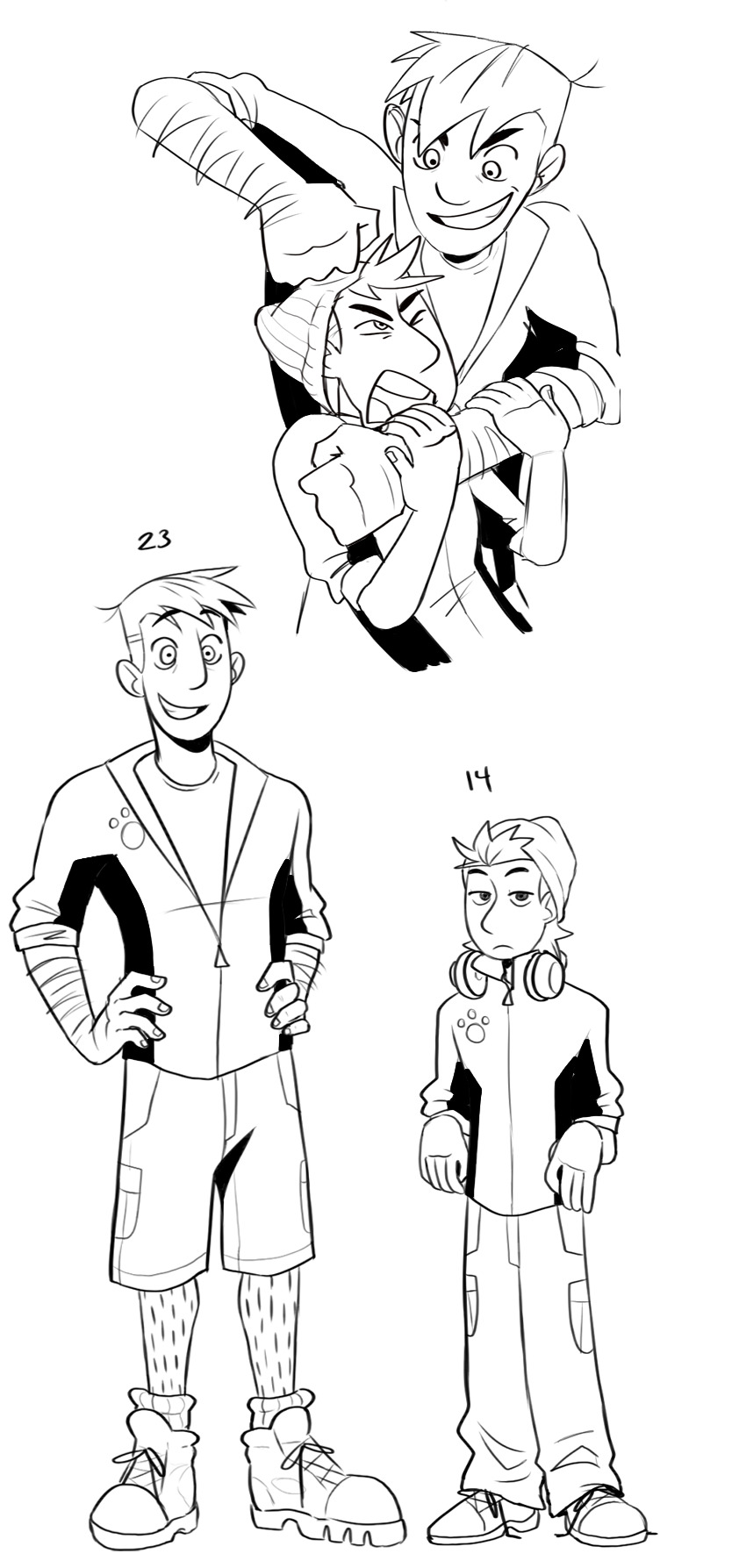
(Dont worry I'm not done with Reprogrammed yet BUT THIS HAS SO MUCH POTENTIAL IT HAS NOT LEFT MY BRAIN)
I can smell the dramatic "YOU'RE NOT MY DAD!!!" exclamation from here
#wild kratts#chris kratt#martin kratt#wild kratts fanart#kratt brothers#Chris is a little emo but he's 14 so aren't they all#also his parents died so give him a break#Martin is the same except oh my god he's so tired#hes trying really really hard to be super responsible and a good guardian to Chris#also I think it would be super intimidating if maybe he's got CPS looming over his head still debating whether he's a fit guardian for Chri#because of his job that requires so much traveling and long hours#and the government is like “are you ssuurreeee Chris is being raised properly??”#and Martin is like “I THINK SO???”#KINDA LIKE IN LILO AND STITCH HOW NANI IS TRYING REALLY HARD TO KEEP CUSTODY OF LILO#BUT THE UNIVERSE IS AGAINST HER#WK Guardianship AU
363 notes
·
View notes
Text
People… its time. I finally have a floor loom. It has 4 shafts and 6 treadles and Ive warped it up for the first time today. Look at it!! Im so exited c:
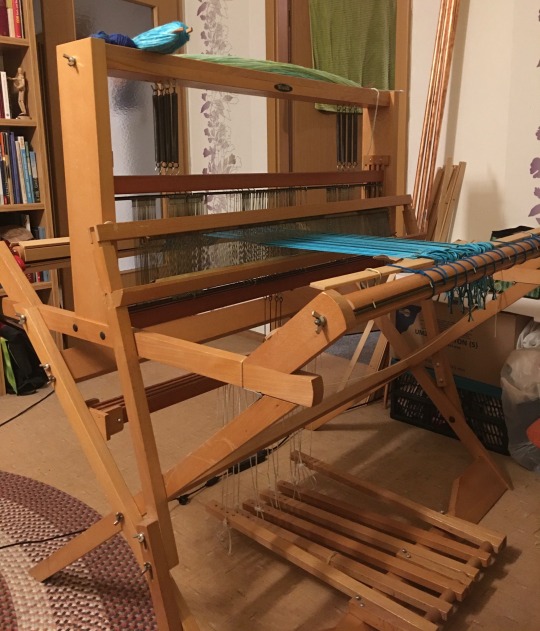
#floor loom#weaving#also it took me hours to get the warp on there#and its really badly trnsioned#but! its on there! and thats all that matters#for now im just gonna do some plain weave#but the scarf after that is gonna have like a heart pattern me thinks
562 notes
·
View notes
Text
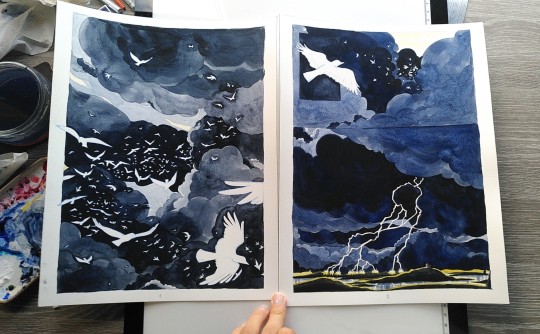

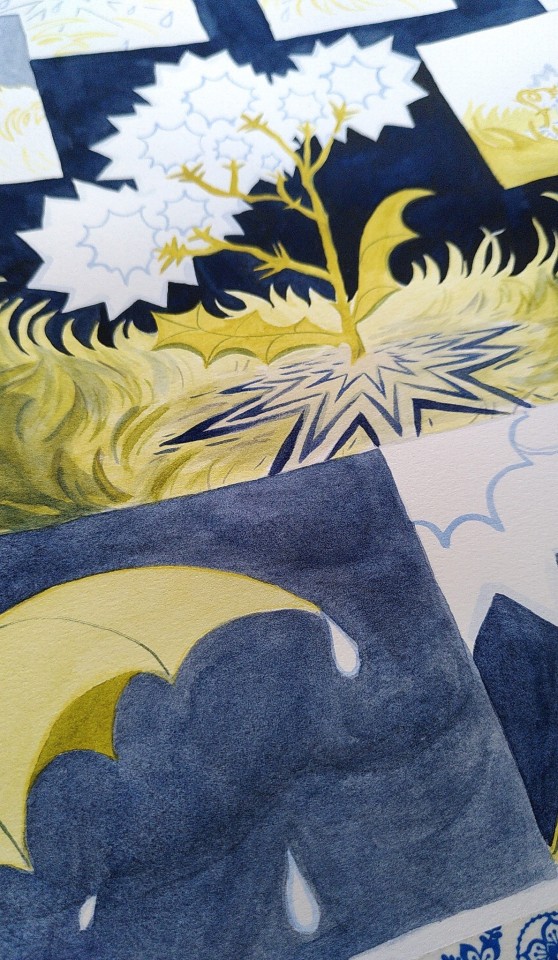
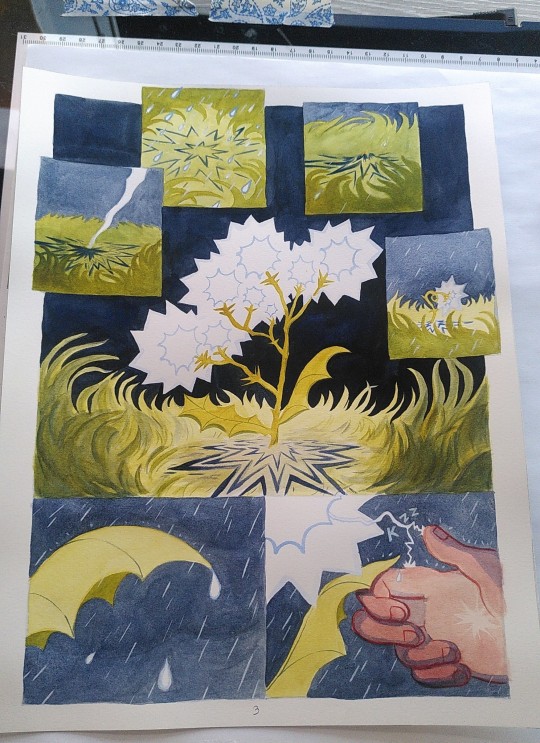
finally got started on the final pages of my comic for Shortbox comics fair 2023 !! 🌼🤞🏻
#the final stretch as the deadline - august 1rst - looms closer and closer#and i look at my 38 page count and i sweat slightly (a lot)#that 3rd page took me between 4 and 5 hours#it would fine if i hadnt accepted a part time job this month#gotta pay the bills but also oh my god will i make it#Shortbox comics fair#watercolour
469 notes
·
View notes
Text
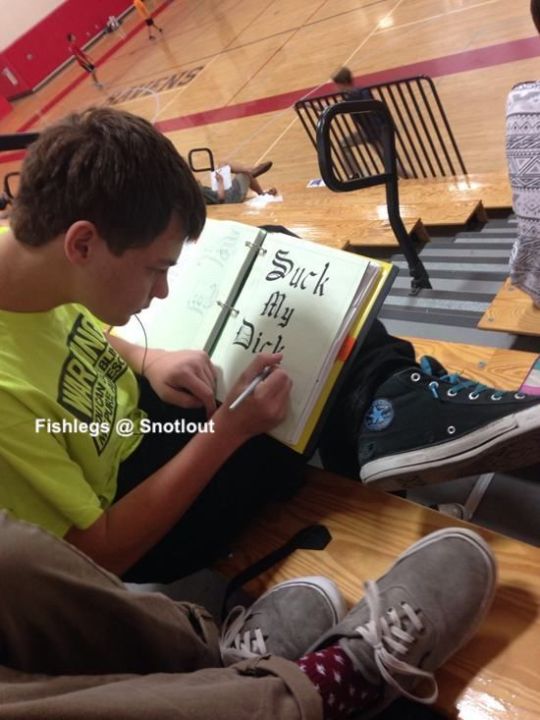




behold.
#that was very commanding of me#i have just spent the last hour explaining my knowledge of dragons to myself#and then i started on literary terms#then i got bored of my own rabbit hole#so i made these#every day i face the looming threat of becoming an english major#httyd#httyd memes
188 notes
·
View notes
Text
My grandma is getting rid of her floor loom and offered it to me. The only issue is I have never even seen a loom in person. She got it 30 ish years years ago but it’s been sitting in her basement for I don’t know how long, so I don’t know what shape it’s in but I did find a listing from someone who has the same loom (X). Apparently it’s from a fairly local company and there’s only a few of these specific looms?
Im very excited to try weaving and have been watching Dolores Jacob’s Learn How To Weave playlist on YouTube and a handful of other videos but if anyone has any advice? Other YouTube playlists or books I could check for at the library?
#candy speaks#weaving#floor loom#idk I thinkkkk I’ll be fine it seems simple enough?#im just excited I wanna share lol#I might not even keep the loom#my pa wants it if I don’t but he want to disassemble it for the wood. it’s all oak wood so he’s hoping he can use it for something#but I kinda wanna see if I can convince them to donate or sell it to a ‘local’ weaving guild#even tho the closest guild is an hour n half away :/#they were gonna BURN IT if me or dad didn’t want it but after I found out the kind of loom it was uh I think they were talked out of that 😂#anyway I’m just gettin my thoughts out really I’m worried I’m gonna mess up the loom somehow or smth idk
62 notes
·
View notes
Text
And now Fernando in all his historical AUs !!
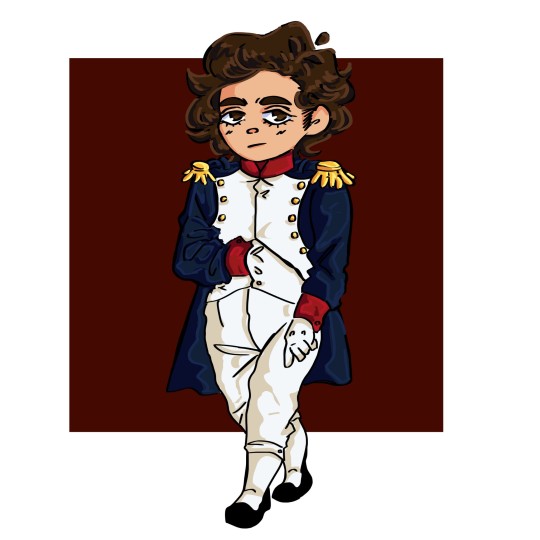


In order with relevant info: Nandopoleon Alonsoparte(x), King Fernando I(x), Napoleonic Hussar(x)
Again: let me know your favorite <3
#i spent so much time on these. and i think my hand is going to crumble up and fall off#like way too many hours but hey very very fun!! :) so its okie :D#him in the king au is just the most ostentatious man to ever exist#maybe when i draw the actual painting ill put more work into thr embroidery#but on such a small scale....idk it kinda looms like bananas LMAO#nandopoleon is so comforting to me. this is actually the first time ive actually drawn him wow#but like i just mean the napoleon pose and outfit. very familar territory to me!!#hussar fernando caused me much mental anguish but i forgive him(the pose......)#and this is the first time ive drawn fernando I with color so i think it turned out well?#hussar AU is so general i love it. i could draw any driver in it please ask me!!!(as if i draw ever rly draw anyone other than seb and nano#these are fun and good and i love them and i love him and i am feeling unparalleled creativity rn and its joyful#fernando alonso#f1 fanart#formula 1 fanart#formula 1#f1#catie.art.#*oops also! hope its at least a bit familar what event hussar fernando is a reference to!!#hussar au#boy king au#nandopoleon alonsoparte
98 notes
·
View notes
Text
aaaaahhhhh finally finished all my zine obligations, i have one more due date approaching and i’m freeee
#pretty sure i have had some sort of due date for a zine or some other project looming over me since july#i need a breaaakkk#now time to slam a nap and get up in 6 hours to go to the rink
23 notes
·
View notes
Text
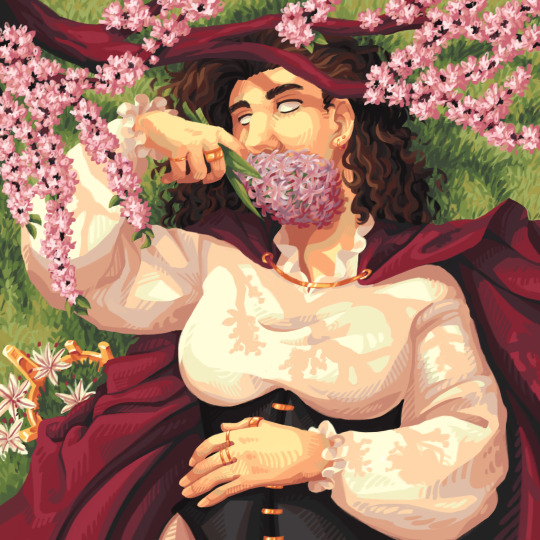
Judas Tree: unbelief, betrayal.
Purple Hyacinth: my regrets follow you to the grave.
Asphodel: i am sorry, please forgive me.
#the eret#dsmp#faeskech#finished#ITS DONE OH MY GOD IM FREE#AND I DID IT BEFORE THE YEAR END TOO#yall dont fucking understand ive had this in my wips folder since february this year#it wasnt difficult at all to do and i love how it turned out#but for some reason every time i opened this file i would get irrationally angry and have to close it after 15 minutes#and then i wouldnt open it for another 2-4 weeks#i finally said fuck this last night and spent an hour to finish it#AND OUT OF THE WIPS FOLDER IT GOES#NO LONGER WILL IT LOOM AND TAUNT ME#definitely learned a lot about fabric while doing this#sts
340 notes
·
View notes
Text






The music just keeps on rolling along
Yeah, I got my friends, and I got my song
I'm gonna be living for the rhythm, I can't go wrong
As long as the music keeps rolling along!
The Jim Henson Hour, Episode 8, Videotape
#the muppets#muppets#the jim henson hour#solid foam#clifford muppet#digit muppet#flash muppet#beard muppet#solid foam drummer#she has no name.....#bonus dr teeth looming in the background with no explanation!#anyways my first gifset!! shoutout to gifcam and ezgif (i will learn elaborate gif making/editing one day)#but i was surprised there were no gifsets of this. especially because of 1. the really fun camera angles and effects#and 2. prime muppet background content (including muppets falling over dramatically)#every time i paused i found new antics. they are the sillies#i wish they showed footage of the performers getting pelted with beach balls
61 notes
·
View notes
Text
Sush and the Bandit King
It was customary, during the years of ivory and palm, for the kings of Shemakha to retreat from their palaces and go forth disguised into the kingdom, that they might themselves ascertain the plights of the smallfolk. Sush, King of the Persimmon Throne, was on one such outing when he and his valets were accosted by bandits near the lawless fields of Nisat. Being the hour after dawn, the King could scarcely defend himself, as the rising sun shone true into his eyes, and so with grudging heart, he chose to yield to his captors. They in turn, recognizing the high personage of their prisoner, bound the King and his companions with rope and made to ride for their leader, though offering their captives every small courtesy out of respect for their station.
Soon enough, passing behind some cliffs, they arrived at the lair of the Bandit King, who himself received Sush and his companions in a warmly lit cavern that was bedecked in carpets, cushions, jewelled trinkets, and such luxuries as a village headman could ill afford. “Good fortune arrives at my threshold!” said the Bandit King, “and I have the privilege of calling the Radiant One my honored guest. Come: tarry a while, set aside the burdens of kingship, and let us present you with the hospitality of Nisat, whom you have denied the pleasure of your visage for so long.”
Seeing that no good would arise from a struggle, Sush acquiesced.
Later that day, the Bandit King led Sush through bustling hamlets and verdant farmland. Every storehouse was filled to the top with grain, and herds of fat cattle frolicked about the fields. “What plenitude flows through barren Nisat!” marveled the King, “and what lofty heights her children shall now certainly attain!”
“‘Tis the work of the Bandit King,” scoffed one of the outlaws. “Sixteen times did they refuse his guidance, and sixteen times did he strike them with the iron! And lo, by his patience, he has achieved what the scribes of Shemakha could not: to bring a watchful eye to defiant Nisat, that she may flourish with no worries of stumbling on her own feet.”
The King heard this, and was humbled.
The following day, the Bandit King again rode with Sush, this time through the towns and trading posts, where teams of highwaymen patrolled the streets, collecting tributes from the docile townsfolk and supervising the exchange of goods in the markets. “What order rules in unruly Nisat!” exclaimed the King. “And what remarkable discipline her people observe!”
“All naught but for the hand of the Bandit King,” sneered one of the entourage. “Sixteen times did they strike down his command, and sixteen times did he raise it high again! Lo, he has achieved through persistence what the armies of Shemakha could not: that is, to establish lawfulness in Nisat, that her children obey his authority without question.”
Hearing this, the King was humbled.
On the third day, the Bandit King yet again made to ride with Sush; but ere they could leave the shadow of the cliffs, he pulled the King aside and inquired of him subtly: “O Radiant One, thou hast beheld the prosperity and stability which have governed Nisat since I enacted my rule. Two places remain which I have not shewn to thee; the hour, alas, permits only a visit to one. Pray: first permit me the honor of thine appraisal, and by this thine indulgence, thou mayest determine the object of our visit.”
And the King knew that by these two choices, the Outlaw meant: freedom, or death.
“Thy friendship and hospitality I must extol,” said he to the Bandit, “and o’er these two passing days, thou hast grown as close to me as mine own brother. O! surely the Wheel has guided me down this slope, in order that our paths may cross. Verily, as thou hast gained a friend in my Self, so have I found an able administrator and governor in thee, who hast accomplished that which the force and splendor of Shemakha have not: namely, to bring wayward Nisat under thy firm rule.
“Such a deed cannot be compensated with praise alone - nay, thou shalt have a hundred of my finest steeds, and fifty bolts of my finest dyed silks, and as many chests of jewels as a train of servants can carry. But most importantly, thou shalt have the earldom of this land, and the power to enact laws in my name; and thou shalt have the authority to appoint headmans from among thy people, according to thy wishes. All this shall I decree.”
And the Bandit King’s head was filled with images of the comforts of noble life. “Thy wisdom knows no bounds, O Radiant One,” he said. “Come: I will shew thee the royal road.” And he charged his men with the safety of Sush and his valets, that they may arrive at the royal palace unmolested; but he himself rode at the fore with Sush, and they conversed and bantered as brothers do.
Presently they came upon a detail of the royal guard that was keeping watch over the border. “You,” said Sush, pointing to the fleetest-of-foot. “Mark my words well. Make haste and call the captain of the guard, and tell him that these men are under my protection. We ride to the royal palace, and he is to escort us there, for these men are under my protection, and I am to invest them with titles and honors. So have I decreed.”
So the fleet-footed one made haste and reported to the captain of the guard, who was in the barracks outside the Great City. The captain hearkened well, and asked: “Did the King specify the men to be His honored guests?”
The messenger replied: “No, my lord.”
The captain then asked: “Did the King extend His gracious hospitality to these men?”
“He did not mention it, my lord,” said the messenger.
Then the captain sighed, and said: “The King is in peril, and these brigands have brought Him here under duress. Only those welcomed under the banner of hospitality are truly safe from His wrathful sword. We must not tarry.” So he gathered a handful of his most seasoned troops, and rode to meet Sush’s party without delay.
He found them not far off, encamped at the Pool of Feathers (where hermits of old once washed stone-salts off petrified men), and as he approached them, the Bandit King hailed:
“Ho! Who is it that draws nigh?”
“The King’s escort, whom He has summoned hither,” replied the captain, as his soldiers slipped into the foliage and encircled the party. Then he turned to Sush, who sat on the ground quietly. “I understand that these men are under Your protection?”
“No longer,” proclaimed Sush, standing up. “I rescind my protection.”
At those words, the royal guards leapt forward and slaughtered the bandits, swift as the summer’s lightning, and the thud of their bodies against the ground was like the steady drumming of sudden rain. Scarce had the corpse of the Bandit King hit the ground when Sush issued a new command.
“Go at once to the fields of Nisat,” he ordered, “and take my retinues with you. Dispatch the outlaws there as you did here, and you will find that they have left the peasants broken and ready to accept the rule of the law. So shall we bring Nisat under the crown, once and for all.”
Thus did Sush, of the Persimmon Throne, subdue the region of Nisat and unify her people under Shemakha, where they would remain for many generations, lending glory to their kings.
Runao’s Commentary:
Mud transforms into sturdy brick as it is beat down by the sun, and brick softens into mud in the cool comfort of water. Trials harden every man equally, but this is not enough - bricks are made to be stacked upon each other, without freedom or consent, and the disciple must constantly ask themselves: who is the bricklayer, and who is the laid brick?
13 notes
·
View notes
Text
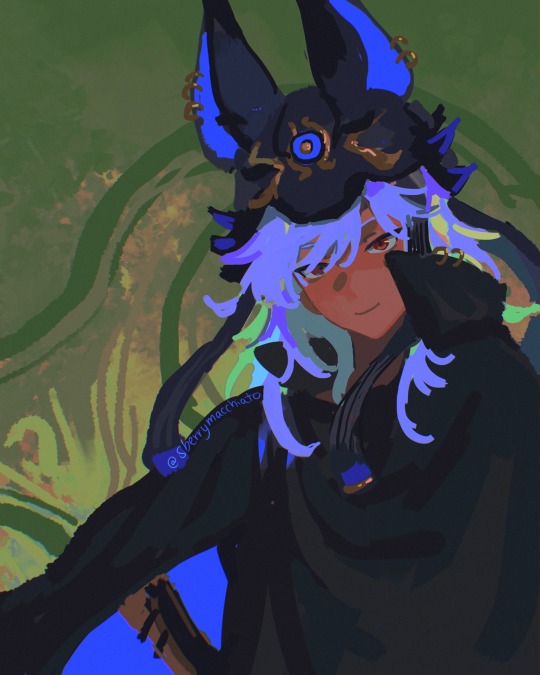
#cyno#cyno art#genshin impact#genshin fanart#rkgk#my art#fanart#this one was done extremely fast the spirit of cyno possessed my pen and i pumped this bad boy out in like an hour and a half in a cafe#bc of the brush used it had no pressure size so it looms more rough but its an interesting look!
309 notes
·
View notes
Text
Thank god Jeffery didn’t die holy shit. I cannot handle going through the death of a comedic yet deeply emotional and empathetic character that brings out the remaining remnants of humanity left in the people around him.
Tibby Devin has done irreparable damage to my brain chemistry.
#opq#ordem paranormal quarentena#kollok 1991#actually hours before the game started today I was worried I wouldn’t enjoy Ordem that much#y’know with the psychological and body horror and the ruthless narrator and the constant threat of death looming over everyone#but then I remembered I watched season 1 and 2 of kollok 1991 live and was like#OH WAIT THIS IS EXACTLY MY KINDA SHIT WHAT AM I TALKING ABOUT#anyway this is my kollok propaganda post for all the ordem enjoyers#I’ve only seen 1991 and bleach but it’s enough to tell you it slaps
37 notes
·
View notes
Text
gdi i read too many different fics in too short a time and there’s one line from somewhere that’s jumped into my brain and attached itself like a barnacle but i can’t for the life of me remember Which of the hundreds of fics from the past few weeks it’s from but i need to find it so bad it was justice league pov of batman and it was diana ruminating on bruce and thinking that she admired his methods because despite appearances he is a gentle man. she wonders if the others have noticed. something something. the way robins cling to his cape and nest in his shadows <- that’s the line driving me crazy i don’t even have the words right I know but the imagery is impeccable i have to find it I have to find it im losing my mind ! !! all of it!!! out the window!! falls over
#ughhhhhh its something something batman creature of the night vengeance terror of gotham pseudo-cryptid looming in the shadows violence writ#in every line of his body and then his black hole of a cape shifts slightly and there’s a little birdie hiding under his leg#giggling with big eyes and litol dimples. protected under the dragons belly#ugh i don’t know . my words arent right. I need to shower and pack my suitcase and pass out I slept four hours last night#honk shoo#vees train of thought#batstuff
34 notes
·
View notes
Text
i think vigo's heart failure is kicking in
#man just kill me already#he was diagnosed w early stage heart failure a year+ ago and his breathing's become more labored within the past 48 hours#ive put thousands of dollars (that i dont have lol) into his care#he keeps stress yawning. still active/eager to eat. but i know how bad this can get and it's looming over me.#i simply cant anymore. and kona's death traumatized me.#i'm ofc taking him to the vet as a walk-in today#but if he's on the cusp of nosediving - and ime animals tend to tank p fast - i might have to make a v difficult decision very soon.#i hope i'm wrong. i'm just bracing myself.#his birthday was this month.#xangoeswah
9 notes
·
View notes
Text
ive gotta be real im kind of losing hope for life
#it feels like it's only get worse and worse lately and i just don't know what to do man#its just like. swallowing me whole#the furure feels so fucking looming no matter what#i feel like a pathetic bum because i genuinely dont know that ill ever be able to take on longer than a 25 hour work week max#and because of how everything is im doomed to be forever dependant on someone covering so much for me#i don't feel like I'm ever going to be secure and i just. i have hopes for the future but any time i try to consider how i get there i just#it feels like everything falls apart#i know it's probably because it's 2 in the morning but i just don't have any faith in my life...#it's hard not to just. consider death sometimes i guess. I'm not actively suicidal. id hardly even say i passively am most of the time#it's just like... i don't fucking know how I'm going to make it out of this man. i feel so hopeless#...rant over
8 notes
·
View notes